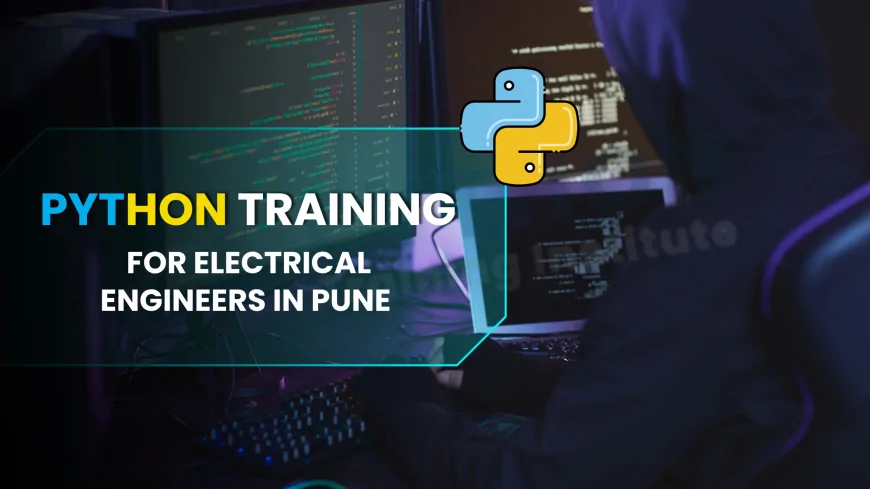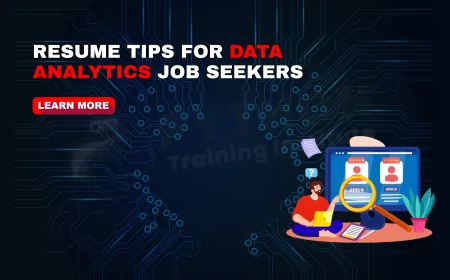Python Training for Electrical Engineers Pune | Specialized Python Training for Electrical Engineering Students
Join top-rated Python training programs for electrical engineers in Pune. Learn automation, data analysis, and hardware control with hands-on projects.

Table of Contents
- Introduction
- Why Python Matters for Electrical Engineers
- Skills Covered in Training
- Training Formats & Delivery
- Project-Based Learning
- Tools & Libraries
- Career Benefits in Pune
- Top Training Centers
- Fees & Duration
- Who Should Enroll?
- Frequently Asked Questions
- Conclusion
Introduction
Electrical engineers in Pune are increasingly leveraging Python to enhance automation, data analysis, and hardware control. If you're an engineer aiming to upgrade your skills, a targeted Python training program can open doors in embedded systems, test automation, and industrial applications.
Why Python Matters for Electrical Engineers
- Rapid prototyping: Write scripts to test hardware components or process logged signals quickly.
- Automation: Automate data collection from sensors, control instruments, and batch-process file data.
- Data analysis: Analyze test logs or performance data using libraries like NumPy and Pandas.
- Visualization: Plot voltage/current/time signals graphically with Matplotlib or Plotly.
- Hardware interfacing: Control Raspberry Pi, Arduino, or other embedded platforms via Python.
- Multi-domain versatility: Use Python in power systems, robotics, machine learning, and more.
Skills Covered in Training
- Core Python: data types, control structures, functions
- File I/O and data handling
- NumPy arrays and Pandas DataFrames
- Signal visualization with Matplotlib/Plotly
- Automation scripting and serial communication
- Hardware interfacing with Raspberry Pi/Arduino
- REST APIs for IoT integration
- Unit testing, debugging, and version control (Git)
- Final capstone project aligned with engineering use cases
Training Formats & Delivery
- Online live classes: Ideal for professionals, interactive sessions with recorded access.
- Weekend workshops: Focus on practical applications over 2–4 weeks.
- Self-paced modules: Ideal for working engineers with mentor support.
- Hybrid formats: Mix of live instruction and guided lab sessions.
Project-Based Learning
Hands-on practice ensures practical mastery:
- Automated test reports from lab equipment
- Sensor data logging and visualization app
- Dashboard for real-time voltage/current monitoring
- Hardware controller using Raspberry Pi
- Batch file analyzer for test logs
Tools & Libraries
- Python & Jupyter Notebook
- NumPy, Pandas
- Matplotlib, Plotly, Seaborn
- PySerial, GPIO Zero
- Flask for lightweight APIs
- Git & GitHub for version control
- Unit testing with pytest or unittest
Career Benefits in Pune
- Enhanced employability for roles in automation, testing, and controls
- Ability to work on embedded systems and IoT solutions
- Contribution to data-driven design and performance optimization
- Freelance opportunities in test automation and instrumentation
- Upward mobility to roles involving data analytics and engineering software
Top Training Centers in Pune
1. WebAsha Technologies
WebAsha Technologies is one of Pune’s most respected institutes for Python training, offering industry-aligned modules ideal for electrical engineers transitioning into software-driven roles.
- Comprehensive curriculum covering core to advanced Python, including OOP, file handling, exceptions, regex, CGI, networking, multithreading, GUI (Tkinter), and database integration
- Hands-on approach with live projects, case studies, and real-world scenarios—essential for scripting, automation, and electrical workflows
- Small batch sizes ensure personalized attention and project monitoring, ideal for engineers needing relevant domain support
- Flexible training schedules—weekdays, weekends, online/offline—catering to working professionals and graduates
- Globally recommended official curriculum and institute-issued completion certificates; aligned with PCEP/PCAP certification paths
- Strong placement support including resume workshops, mock interviews, and alumni referrals—over 1,500 students placed last year
- Extensive post-training support, full-time labs, and flexible group and corporate training options
Why electrical engineers love WebAsha: The syllabus includes file I/O, multithreading, networking, GUI, and database modules—perfectly suited for test automation, data acquisition, and equipment interfacing tasks common in engineering environments.
Fees & Duration
- Fees: ₹10,000–₹25,000, depending on level and project scope
- Duration: 4–8 weeks full-time; 8–12 weeks part-time/workshop series
- Options: Weekend, hybrid, and online batches
Who Should Enroll?
This specialized Python training is designed specifically for individuals in the electrical engineering domain who want to enhance their programming, automation, and data-handling skills. Whether you're a student or an experienced professional, this course can add measurable value to your career.
- Electrical Engineering Students: Final-year or graduate students looking to boost their employability with in-demand tech skills.
- Testing & Quality Engineers: Professionals working on automated testing of circuits, devices, or embedded systems.
- Instrumentation Engineers: Those who need to automate data acquisition and analyze sensor data from lab or industrial equipment.
- Embedded System Developers: Engineers working with microcontrollers, Raspberry Pi, or Arduino who need scripting for control and diagnostics.
- R&D Engineers: Individuals involved in product development, where data logging, simulation, and interfacing are crucial.
- Automation Specialists: Engineers working in factory automation, PLC, SCADA, or robotics who want to build Python-based control systems.
- Job Seekers: Recent graduates or laid-off employees aiming to switch to software development or data roles within the engineering space.
- Freelancers & Consultants: Independent professionals offering services in testing, prototyping, or embedded solutions looking to upgrade their toolkit.
Bonus: Even professionals from non-software departments can enroll if they’re interested in data analysis, system integration, or smart device automation using Python.
Frequently Asked Questions (FAQs)
1. Why use Python instead of MATLAB?
Python is open-source, more versatile in general programming, and supports hardware and API integrations better.
2. Do I need hardware to learn?
Basic access to Raspberry Pi or lab equipment is recommended, but simulation alternatives exist.
3. Will I learn real-time data parsing?
Yes—courses include reading and plotting real-time sensor data.
4. Is coursework recorded?
Live classes are recorded and available for revision.
5. Do courses cover version control?
Yes—Git and GitHub integration is standard part of training.
6. Can I work on my own project?
Yes—mentors assist in customizing or guiding your own projects.
7. Are placement drives included?
Placement assistance and resume workshops are part of the course offerings.
8. Is such training beginner-friendly?
Yes—training starts at basic Python syntax before advancing to engineering use cases.
9. Do I earn certificates?
Yes—completion certificates and optionally industry-recognized credentials are provided.
10. Will this help in IoT roles?
Yes—hardware interfacing and device communication modules are included.
11. Are fees inclusive of materials?
Yes—courseware, sample code, and lab access are included.
12. Is mentorship available post-course?
Support for doubts and projects continues for several months post-training.
13. Are EMI options available?
Yes—select institutes offer EMI or installment plans.
14. Do I need Linux?
Basic Linux familiarity helps but isn’t mandatory—support is provided.
15. Will I learn API creation?
Yes—light web APIs using Flask are taught for remote data access.
16. Is data visualization covered?
Yes—plotting libraries are used extensively for signal and data plotting.
17. Can I use training for freelancing?
Yes—you’ll be equipped to build automation tools or lab dashboards for clients.
18. Does it cover advanced analytics?
Basic analytics via Pandas is covered; deep analytics is optional or advanced section.
19. Will I learn serial communication?
Yes— courses include PySerial for device interfacing.
20. Is the training Pune-specific?
Yes—the examples and projects are oriented to local industry needs and lab equipment standards common in Pune.
Conclusion
Python training tailored for electrical engineers in Pune bridges the gap between hardware and smart software solutions. With practical projects, career support, and flexible formats, these courses offer a valuable skill upgrade. Choose a program aligned with your goals in automation, data visualization, IoT, or instrumentation—and accelerate your engineering career.
What's Your Reaction?
 Like
0
Like
0
 Dislike
0
Dislike
0
 Love
0
Love
0
 Funny
0
Funny
0
 Angry
0
Angry
0
 Sad
0
Sad
0
 Wow
0
Wow
0














